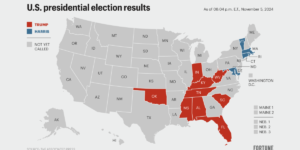Warren Buffett Just Sent Wall Street a Historic $127 Billion Warning. History Says the Stock Market Will Do This Next.
Warren Buffett is one of the most renowned figures on Wall Street. That’s partly because he is worth about $140 billion, and partly because he’s built Berkshire Hathaway (NYSE: BRK.A) (NYSE: BRK.B) into one of the largest companies on the planet through a combination of prudent acquisitions and stock purchases.
Indeed, since Buffett took control of the company in the mid-1960s, Berkshire shares have returned about 20% annually, while the S&P 500 (SNPINDEX: ^GSPC) has returned a little more than 10% annually. That outperformance adds gravity to certain capital allocation decisions Buffett and his team have made this year:
Start Your Mornings Smarter! Wake up with Breakfast news in your inbox every market day. Sign Up For Free »
-
Berkshire had a record $325 billion in cash and short-term investments in U.S. Treasury bills on its balance sheet as of Sept. 30. The company has never had that much liquid capital available for investment.
-
Berkshire has sold a record amount of stock this year. Net equity security sales topped $127 billion through Sept. 30. That marks the most aggressive selling behavior in company history in terms of absolute dollars.
Collectively, Berkshire’s record cash position and record stock sales are a historic warning for Wall Street. Buffett and his fellow investment managers are clearly struggling to find reasonably priced stocks.
But individual investors should not misinterpret that warning as a reason to avoid the stock market. Here’s why.

Since 2010, Warren Buffett’s Berkshire Hathaway has been a net buyer of stocks — meaning its equity security purchases exceeded its equity security sales — in seven years. In many cases, those events preceded strong returns in the S&P 500 during the subsequent year.
The table shows each year in which Berkshire was a net buyer of stocks, the total value of the stocks Berkshire bought during the year, and the S&P 500’s return in the next year. For instance, Berkshire’s net equity security purchases totaled $14.2 billion in 2011, and the S&P 500 returned 13% in 2012.
|
Year |
Net Stock Purchases |
S&P 500’s Return During the Next Year |
|---|---|---|
|
2011 |
$14.2 billion |
13% |
|
2013 |
$4.7 billion |
11% |
|
2015 |
$1.5 billion |
10% |
|
2017 |
$0.8 billion |
(6%) |
|
2018 |
$24.4 billion |
29% |
|
2019 |
$4.3 billion |
16% |
|
2022 |
$34.2 billion |
24% |
|
Average |
N/A |
14% |
Data source: YCharts. Table by author.
As shown, since 2010, the S&P 500 has returned an average of 14% during the 12 months following years in which Berkshire was a net buyer of stocks. Comparatively, the S&P 500 returned an average of 12% during all years in that period. That means Buffett and his team have typically leaned into stocks ahead of above-average years.
Since 2010, Berkshire has been a net seller of stocks — meaning its equity security sales exceeded its equity security purchases — in seven years (excluding the current one). The table lists each year in which Berkshire was a net seller, the total value of the stocks Berkshire sold during the year, and the S&P 500’s return in the subsequent year.
|
Year |
Net Stock Sales |
S&P 500’s Return During the Next Year |
|---|---|---|
|
2010 |
$1.6 billion |
0% |
|
2012 |
$0.7 billion |
30% |
|
2014 |
$1.9 billion |
(1%) |
|
2016 |
$12 billion |
19% |
|
2020 |
$8.6 billion |
27% |
|
2021 |
$7.4 billion |
(19%) |
|
2023 |
$24.2 billion |
21%* |
|
Average |
N/A |
11% |
Data source: YCharts. The asterisk indicates that the S&P 500’s performance in 2024 is not final. Table by author.
As shown, since 2010, the S&P 500 has returned an average of 11% during the 12 months following years in which Berkshire was a net seller of stocks. Remember, the S&P 500 returned an average of 12% since 2010. That means Buffett and his team have typically leaned away from stocks before below-average years.
Here’s how investors should interpret that information: History says it’s sensible to invest more aggressively following years in which Berkshire is a net buyer, and less aggressively following years in which it was a net seller. However, it would be wrong to totally avoid the stock market in either scenario.
For instance, history says the S&P 500 will return 11% next year. While that is below the annual average of 12% since 2010, missing those gains would still be problematic, and the problem would compound over time.
Since 2010, the S&P 500 has returned a cumulative 141% during the 12-month periods following years in which Berkshire was a net seller. But over the same period, the S&P 500 has returned a cumulative 427% when all years are included in the calculation. So, investors who selectively held an S&P 500 index fund following years in which Berkshire was a net buyer would have underperformed investors who held an S&P 500 index fund without regard for whether Berkshire was buying or selling stocks.
There is another reason investors shouldn’t read too deeply into Berkshire’s record $325 billion cash position. While it certainly suggests Buffett and his fellow investment managers are struggling to find reasonably priced stocks, Berkshire’s investment options are limited by the sheer size of the company.
To elaborate, Berkshire’s stock portfolio was worth $272 billion as of Sept. 30, meaning it accounted for more than 40% of the company’s $629 billion book value (which is a good proxy for intrinsic value). Very few stocks are large enough to have a consequential impact on the company’s book value. Buffett himself mentioned that problem in his latest shareholder letter:
There remain only a handful of companies in this country capable of truly moving the needle at Berkshire, and they have been endlessly picked over by us and by others. Outside the U.S., there are essentially no candidates that are meaningful options for capital deployment at Berkshire. All in all, we have no possibility of eye-popping performance.
To be clear, stocks are historically expensive. The S&P 500 currently trades at 21.3 times forward earnings, a premium to the five-year average of 19.6 times forward earnings. But investors should not interpret Berkshire’s record cash position to mean there are no worthwhile investments. Instead, they should view it as a warning to carefully consider valuations before buying stocks.
Ever feel like you missed the boat in buying the most successful stocks? Then you’ll want to hear this.
On rare occasions, our expert team of analysts issues a “Double Down” stock recommendation for companies that they think are about to pop. If you’re worried you’ve already missed your chance to invest, now is the best time to buy before it’s too late. And the numbers speak for themselves:
-
Amazon: if you invested $1,000 when we doubled down in 2010, you’d have $22,050!*
-
Apple: if you invested $1,000 when we doubled down in 2008, you’d have $41,999!*
-
Netflix: if you invested $1,000 when we doubled down in 2004, you’d have $407,440!*
Right now, we’re issuing “Double Down” alerts for three incredible companies, and there may not be another chance like this anytime soon.
*Stock Advisor returns as of November 4, 2024
Trevor Jennewine has no position in any of the stocks mentioned. The Motley Fool has positions in and recommends Berkshire Hathaway. The Motley Fool has a disclosure policy.
Warren Buffett Just Sent Wall Street a Historic $127 Billion Warning. History Says the Stock Market Will Do This Next. was originally published by The Motley Fool








